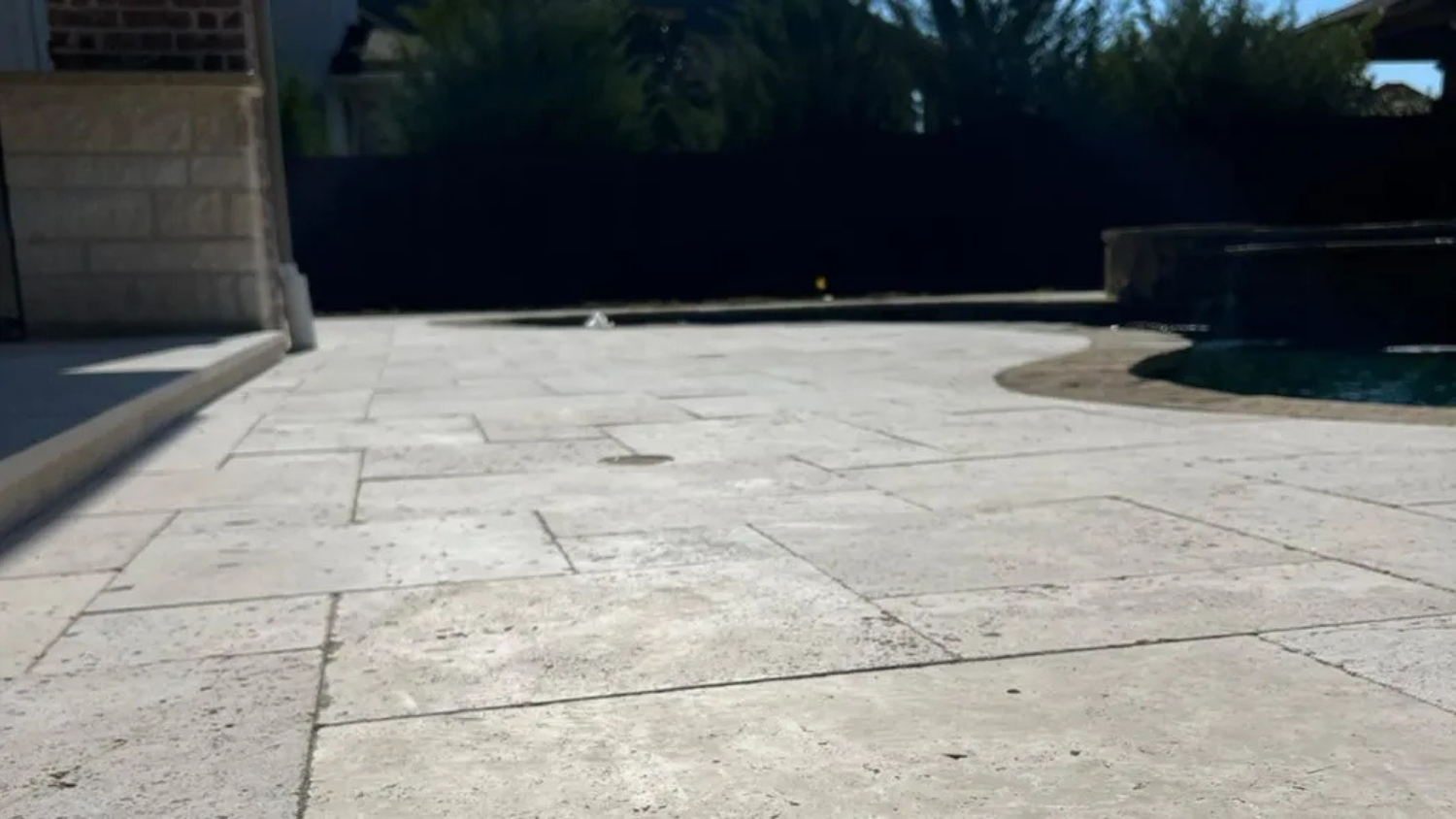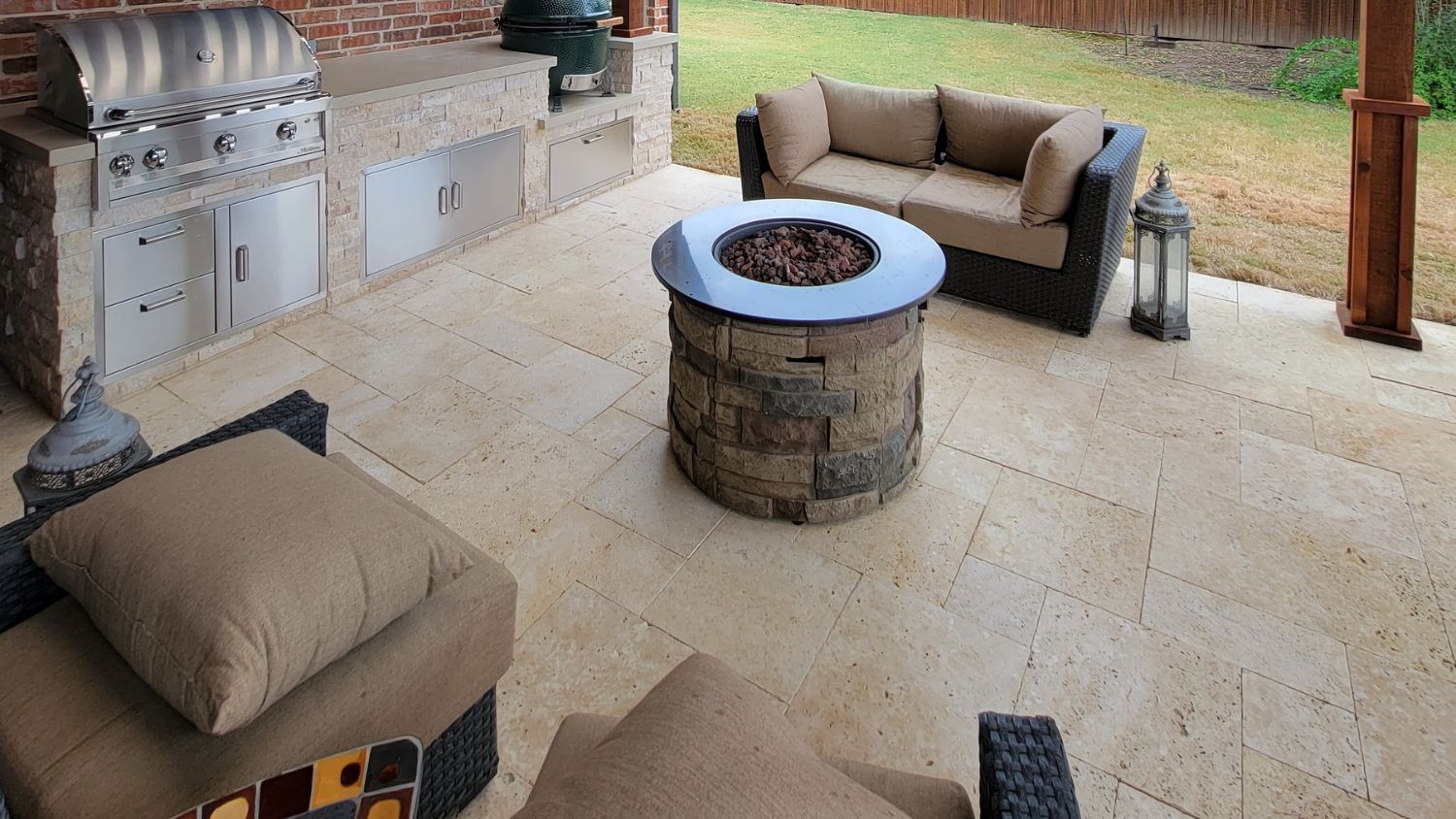Travertine is a very common material that's used in hardscaping projects around DFW homes for a number of reasons, but with all the great options like concrete, stone, and, of course, wood, you might wonder why travertine is so in-demand as a pool decking material.
Let's look at travertine pool decks pros and cons, comparing the good with the bad, to understand why we (and many other custom pool builders in Dallas) recommend travertine around pools and adjacent outdoor living spaces.
But first, let's cover the basics: what is travertine, where does it come from, and what makes it useful as a pool decking material?
What Is Travertine?
Travertine is a sedimentary stone formed out of calcium carbonate and characterized by a porous surface covered in small holes and grooves.
These uneven surface features were created during its formation in hot springs and limestone caves.
Where Does Travertine Come From?
Travertine comes from freshwater hot springs and limestone caves where mineral-rich water flows, depositing calcium carbonate.
The unusual process that forms travertine over time also produces its range of colors: from warm, earthy tones and browns all the way to lighter tans and creams.
Each piece of travertine is one-of-a-kind, boasting subtle differences in color and texture that make it prized in construction.
This process also creates a porous texture that provides travertine its special edge over other pool decking materials: a slip-resistant surface.
What Is Travertine Used For in Building Today?
Travertine is often seen in flooring installations, both indoors and outdoors, due to its strength and slip resistance.
It's extremely popular for pool decks, because of its porous surface that absorbs water and stays cool to the touch.
Travertine tiles are also commonly used in bathrooms for countertops and backsplashes, as they resist moisture and possess a naturally elegant look.
On the exterior of the home, travertine is frequently used in patios, walkways, and even facades, especially in North Dallas where its rustic elegance is especially popular.
(Read the original post on Medium)

Travertine Pool Decking – Pros
Travertine offers several advantages that make it a popular choice for pool decking in both residential and commercial settings.
Here are some of the key benefits of using travertine for your pool area:
Non-Slip Surface
Travertine's porous surface provides the best possible slip resistance, making perfect for pool decks. The tiny pits and grooves in the stone create friction underfoot, reducing the risk of slips and falls even when wet.
This safety feature is especially very important around pools where water splashes are common.
Our pool customers love how travertine maintains its non-slip properties without sacrificing good looks, and, as the builder, we're always happier with solutions that are as safe as they are beautiful.
Heat Resistant
Another standout feature of travertine pool decking is its heat-resistant properties. Some materials (like concrete) quickly become too hot for bare feet under the sun, especially in Texas.
Travertine, on the other hand, stays relatively cool to the touch.
This characteristic is a game-changer for barefoot comfort around the pool. Our customers love how travertine reflects heat rather than absorbs it and barely feels warm, even on the hottest summer days.
Pool-goers never enjoy the dance of hopping from one foot to another across a blazing deck, so they'll love you for installing travertine.
Lasting Power
Travertine's endurance is truly impressive, with a long lifespan of up to 100 years when properly maintained.
It takes heavy wear and tear and harsh weather with ease and stands the test of time without concern.
Travertine pool decks resist cracking, chipping, and fading, maintaining their beauty for decades. And this longevity makes it a cost-effective choice in the long run, despite the initial investment.
A very important feature around pools: travertine also withstands the assault of pool chemicals and UV rays, further cementing its status as a top-tier pool decking option.

Travertine Pool Decking – Cons
While travertine does offer numerous benefits for pool decking, it's worth reviewing its drawbacks as well.
Here are the potential downsides of using travertine around your pool area:
Stains Easily
Travertine's porous nature makes it particularly susceptible to staining. Pool chemicals, sunscreen, and food spills can quickly seep into the stone, leaving ugly marks and stains.
Regular sealing helps, but it's not foolproof.
To maintain a pristine look, you'll need to be vigilant about cleaning spills immediately and resealing the surface from time to time.
Freeze/Thaw Cracking & Popping
In regions with freeze-thaw cycles, travertine pool decks faces some challenges.
As water seeps into the stone's pores and freezes, it expands, causing cracks or "popping" of the surface.
This issue is particularly problematic for inground pools. Proper installation techniques and regular sealing help reduce this risk but, even with these precautions, freeze-thaw damage remains a concern for travertine pool decks in colder regions.
Fortunately, here in the Dallas / Fort Worth area, we don't have to worry too much about this potential problem.
Travertine Tile Styles
In tile format, Travertine offers a treasure trove of styles to explore for your pool deck, in all kinds of hues and finishes.
Classic travertine pavers boast a neutral color scheme, ranging from classy cream to beige to elegant ivory tones. Travertine pool decking has a vibe of distinctly southern elegance and its neutral palette complements a wide range design styles.
For a cooler appearance, silver travertine pavers deliver stunning silver-grey tones with little color variations.
If light and airy is more your style, ivory travertine pavers are the way to go; as they showcase a color palette from creamy to light beige, which will brighten up your pool area.
Classic light travertine pavers offer a spectrum of beige tones in subtle variations, that evoke a sophisticated yet relaxed atmosphere.
When it comes to finishes, honed travertine tiles are a popular choice that feature a flat, satin-like smooth surface with a matte finish. While smooth, this finish maintains travertine's special non-slip surface; a luxury upgrade for pool deck surfaces.
Texas travertine typically comes in colors like white or cream, burnt sienna, yellow and orange/red, and gray. Other shades are still accessible, but the cost goes up on imported travertine tile versus the classic Texas varieties.
Each travertine tile will be unique, with natural variations in color and pattern, and this diversity is one of its best features. Installing travertine guarantees your pool deck will be one-of-a-kind, reflecting your personal style, while still putting pool safety first.
Why Travertine Is Our Favorite Material For Pool Decking
We're big, BIG fans of travertine pool decks, and it's easy to see why.
Travertine boasts a unique combination of beauty and practicality that's hard to beat. Its porous surface provides excellent slip resistance, making it a safer choice around pools. And it's resilience is off the charts – with proper care, it can last over 100 years!
Travertine tiles come in a variety of warm, earthy tones that create a luxurious atmosphere around your pool. From classic ivory to silver and light hues, there's a travertine paver to match any design aesthetic.
And one of the coolest things about travertine is working with its natural variation in color and pattern; selecting each tile to give your pool deck a one-of-a-kind look. These small touches create a more personalized design that still feels cohesive and elegant.
That travertine's a fit for so many applications is another big plus. It's great for pool decks, but perfect for patios, walkways, and even indoor flooring as well; making it a great option when you want to create a seamless indoor-outdoor living space.
Give us a call today to discuss how travertine can enhance your next outdoor living project. We'll come walk your space, listen to your goals, and provide a quote on the upgrades you want -at no cost and no obligation. Let's get started!


